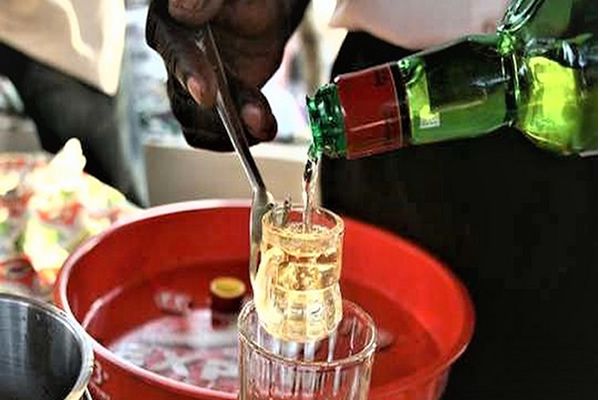A Professor of Medicine and Nephrology at the University of Ghana Medical School, Prof. Vincent Boima, has called for a comprehensive scientific stud
A Professor of Medicine and Nephrology at the University of Ghana Medical School, Prof. Vincent Boima, has called for a comprehensive scientific study into the local gin, akpeteshie, to determine its safety for human consumption.
Speaking at a public lecture in Accra, Prof. Boima noted that akpeteshie contains methanol, a substance he described as toxic and harmful to the body.
“It is toxic. But we are consuming this in large amounts,” he said. “That can be a potential reason to say maybe there is kidney disease. It could increase your risk of kidney stones, etc. So, the local akpeteshie per se has to be studied to see if it is safe for our consumption or not.”
The lecture formed part of activities marking the 25th anniversary celebration of the University of Ghana College of Health Sciences.
The event, held over two days, featured several health experts, including Dr. Dwomoa Adu, Senior Research Fellow at the Korle Bu Teaching Hospital, who also shared insights on public health and non-communicable diseases.
The lecture, which was on the theme “To Eat or Not to Eat: Dietary Habits and the Courting of Kidney Diseases,” focused on how lifestyle and consumption patterns contribute to rising cases of kidney disorders in Ghana.
Methanol
Prof. Boima explained that methanol is commonly found in akpeteshie as a natural byproduct of fermentation and can also result from poor distillation practices.
While the main active ingredient in akpeteshie is ethanol, he noted that the presence and concentration of methanol can vary widely. Some studies, he said, have found dangerously high levels of methanol in locally distilled samples, underscoring the need for scientific testing and regulation to ensure consumer safety.
Consumption of methanol, Prof. Boima cautioned, can cause severe health complications, including blindness and even death, stressing the urgent need to study and regulate its levels in locally distilled spirits.
At the event, Dr. Dwomoa Adu, Senior Research Fellow at the Korle Bu Teaching Hospital, also addressed participants, while Prof. Vincent Boima, a Professor of Medicine and Nephrology at the University of Ghana Medical School, awaited his turn to speak.
Excessive Water Intake
Touching on hydration, Prof. Boima cautioned against the excessive intake of water, explaining that balance was key to maintaining proper body function.
“Our professional nutritionists have already educated the public about water intake. Nobody is saying we should drown ourselves with water,” he remarked.
He explained that while adequate hydration is essential, drinking too much water can lead to water intoxication, a condition in which excess fluid dilutes essential electrolytes, especially sodium.
“When the sodium level drops too low, you can experience seizures,” he warned.
Prof. Boima advised that individuals should aim for adequate water intake based on body weight, noting that hydration needs differ from person to person.
“Adequate is relative,” he said. “Some people take about two to three litres of water per hour, but ideally, water intake should correspond to your body weight. There are established formulas and body mass indices that can help estimate how much fluid is required for optimal health.”
Paracetamol
Addressing concerns about the effect of paracetamol on the kidneys, Dr. Dwomoa Adu, Senior Research Fellow at the Korle Bu Teaching Hospital and the University of Ghana Medical School, clarified that ordinary doses of paracetamol — up to three or four grams a day — do not cause kidney damage.
“So, it’s a safe painkiller in that respect,” he said, adding that paracetamol is safer than anti-inflammatory or non-steroidal anti-inflammatory drugs (NSAIDs), which are more likely to harm the kidneys when overused.
However, Dr. Adu cautioned that overdosing on paracetamol constitutes self-poisoning and can lead to serious health complications, including kidney failure.
He also dispelled misconceptions about sweetened cocoa beverages causing kidney problems, explaining that such drinks are only harmful when they contribute to diabetes due to excessive sugar intake.
“Unless you become diabetic from consuming too much sugar — and even then, it would take about 10 to 15 years for kidney damage to develop — taking cocoa as a drink itself does not cause kidney damage,” he assured.
